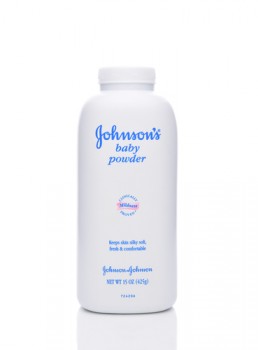Johnson & Johnson ordered to pay nearly $4.7B in talcum powder case

Lunasee Studios/Shutterstock.com.
Jurors in St. Louis awarded nearly $4.7 billion in damages on Thursday in a suit that claimed Johnson & Johnson baby powder caused 22 women to get ovarian cancer, including six women who died.
Jurors awarded $550 million in compensatory damages and $4.14 billion in punitive damages, report the St. Louis Post-Dispatch, the Wall Street Journal and the New York Times.
Lawyers for the plaintiffs expect the defense to file a motion to reduce the award because state law restricts punitive damages to five times the amount of compensatory damages, according to the Post-Dispatch.
A female juror, who did not want her name used, told the Post-Dispatch that jurors arrived at the punitive damages amount by multiplying the figure Johnson & Johnson earns each year for selling baby powder by the 43 years that the company has denied the product contained asbestos.
The plaintiffs’ lawyer, Mark Lanier, told jurors in opening arguments that Johnson & Johnson had “rigged the tests” to hide that its baby powder contained asbestos, the National Law Journal reported in June. He said the company should have replaced talcum powder with corn starch, which would be safer but less profitable.
Johnson & Johnson’s lawyer, Peter Bicks of Orrick, Herrington & Sutcliffe, had argued that many studies and government regulators had found no link between baby powder and ovarian cancer. He said Johnson & Johnson doesn’t want asbestos in its talc and it has been careful to make sure it wasn’t in the product.
Defense lawyers had sought to dismiss 17 of the plaintiffs who lived outside Missouri, citing the Supreme Court’s 2017 decision in Bristol-Myers Squibb v. Superior Court of California. The decision said California courts did not have specific jurisdiction to hear the claims of nonresidents in a Plavix class action when those plaintiffs didn’t buy or ingest the drug in the state.
Judge Rex Burlison rejected the defense request because the plaintiffs had shown a Missouri connection, partly because a talc company that worked with J&J had a plant in Missouri, according to the National Law Journal.
In a statement, Johnson & Johnson said it is “deeply disappointed in the verdict” and it plans to “pursue all available appellate remedies.”
The statement said the verdict “was the product of a fundamentally unfair process that allowed plaintiffs to present a group of 22 women, most of whom had no connection to Missouri, in a single case all alleging that they developed ovarian cancer. The result of the verdict, which awarded the exact same amounts to all plaintiffs irrespective of their individual facts, and differences in applicable law, reflects that the evidence in the case was simply overwhelmed by the prejudice of this type of proceeding.
“Every verdict against Johnson & Johnson in this court that has gone through the appeals process has been reversed and the multiple errors present in this trial were worse than those in the prior trials which have been reversed.”



